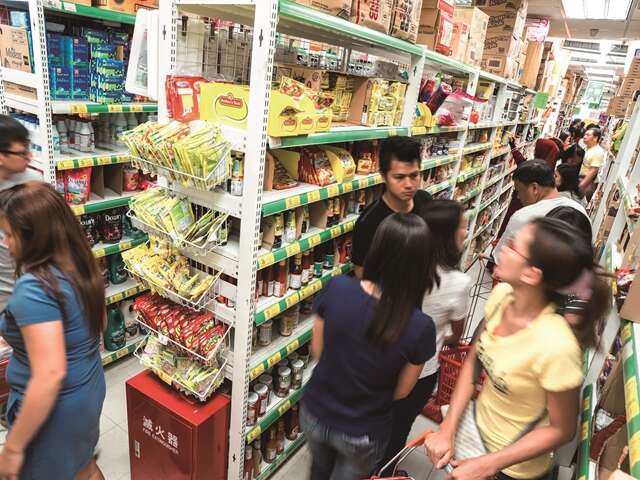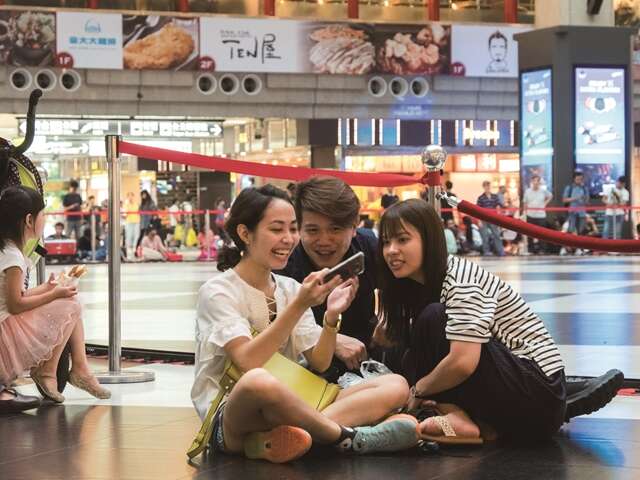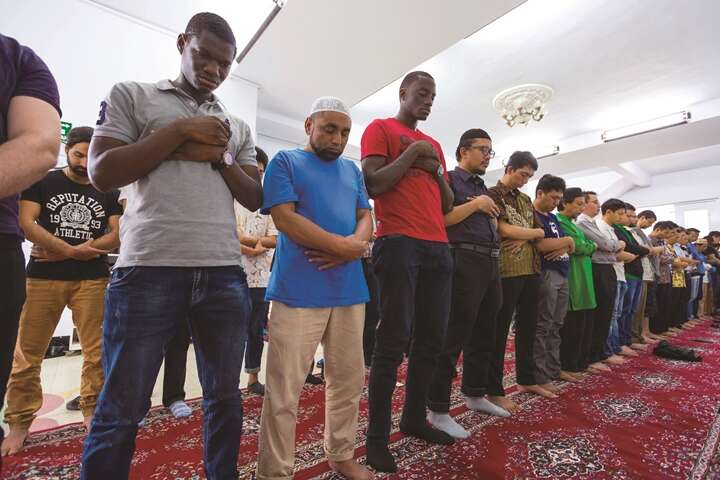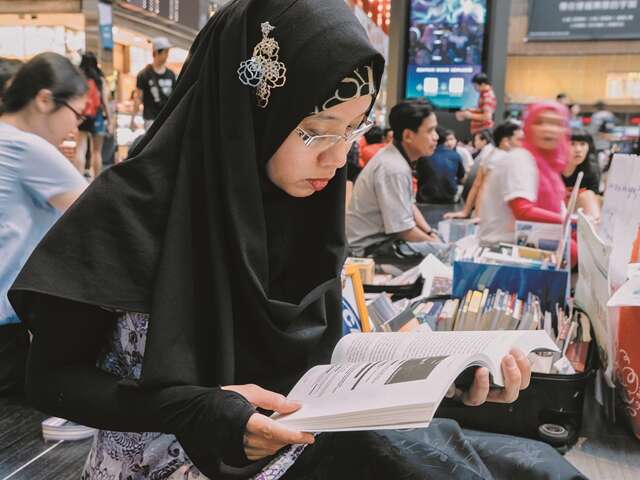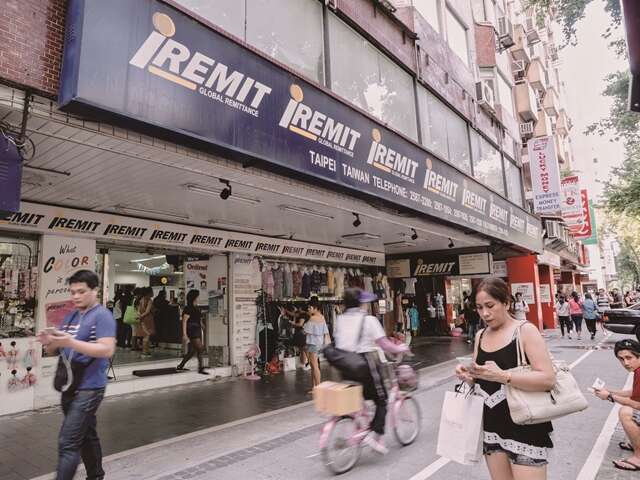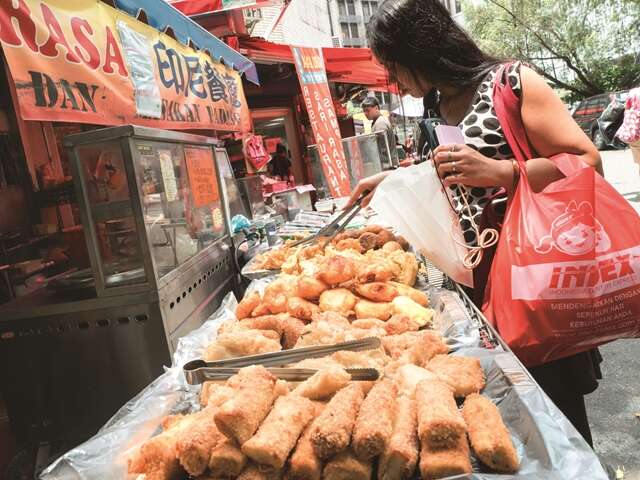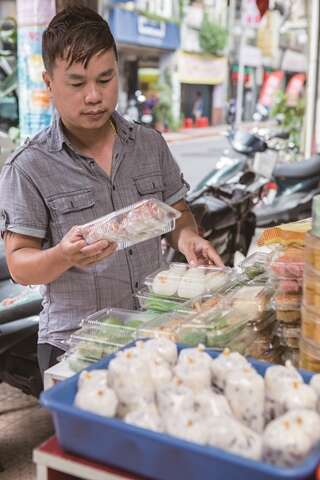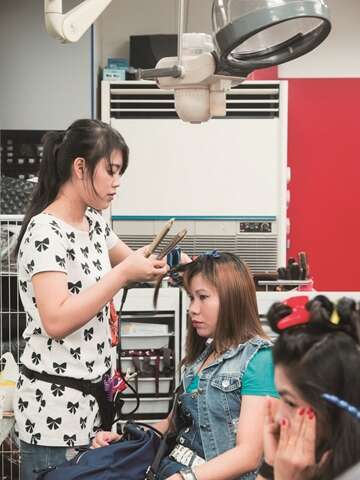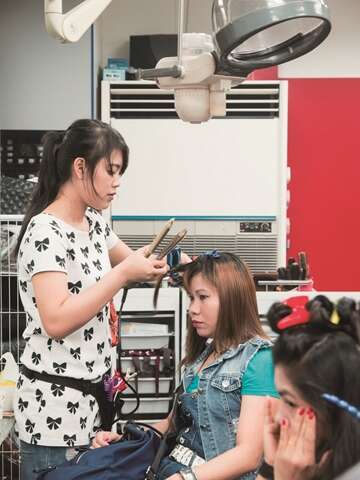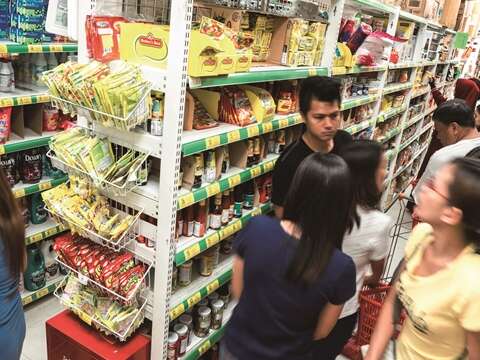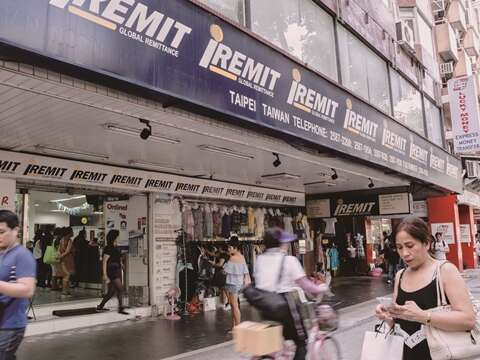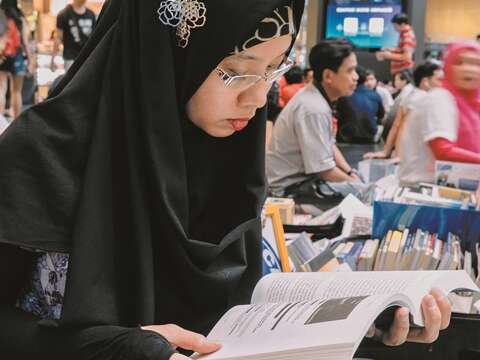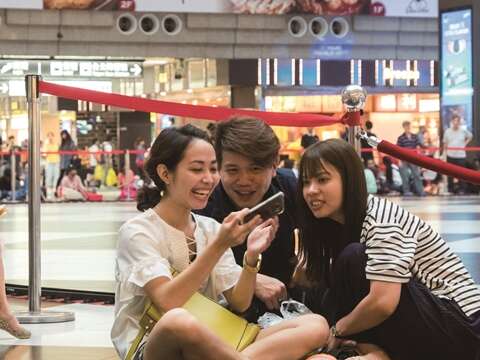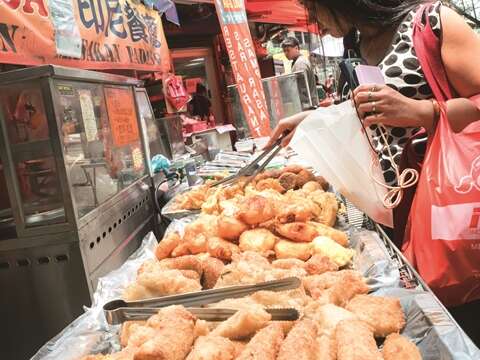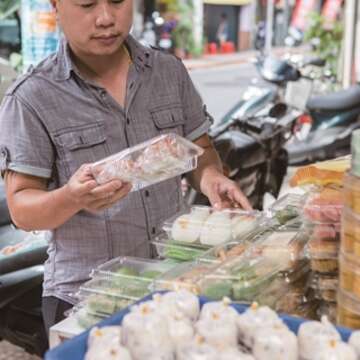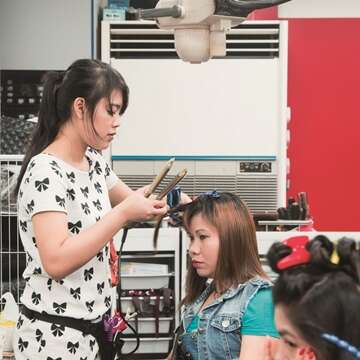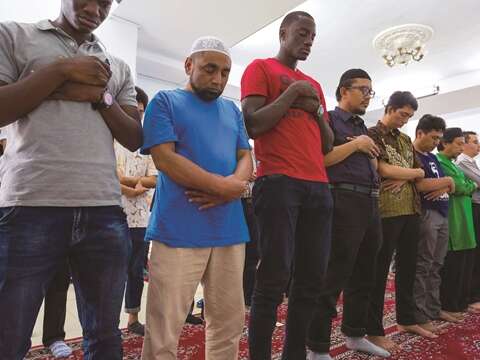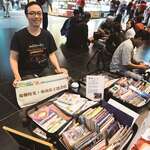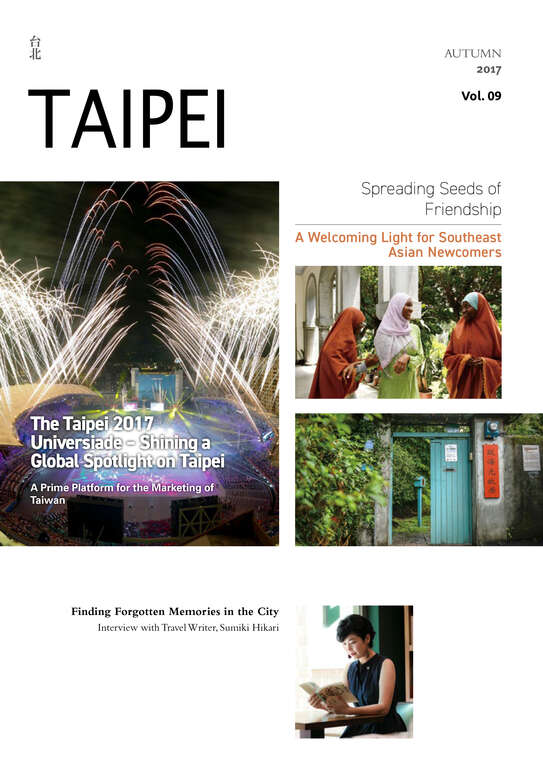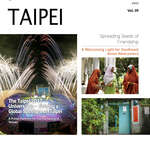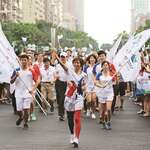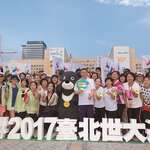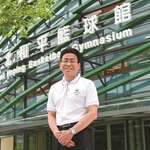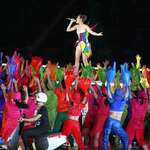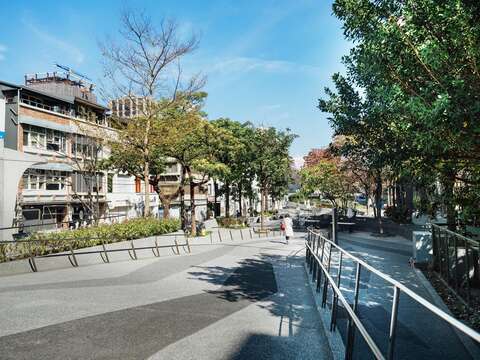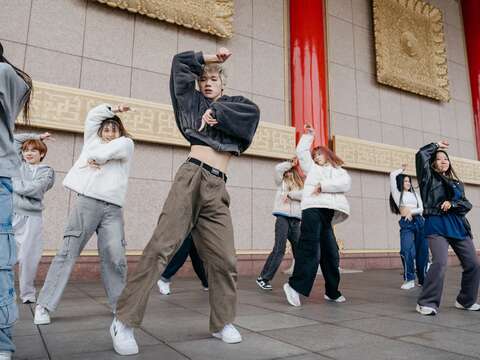Post date:2017-09-13
1483
Greater South Asian Influence Brings New Life
Embracing New Immigrants, Respecting Different Cultures
Article|Tu Xinyi Photos|Xu Bin, Yang Zhiren, Zhou Jiahui
With crowds surging in and out, Taipei Main Station is the hub of transit in Taipei. People from all over pass through, transfer or meet here. On weekends and holidays, its lobby is especially crowded and busy. Southeast Asian immigrants and migrant workers sit on the floor in groups, listening to music, chatting, eating, and sharing their feelings and their lives. You will hear people from Vietnam, Indonesia, and Thailand conversing happily, and feel yourself transported to one of those countries. It’s totally different from the normal Taipei scene!
▲Because more and more Southeast Asian immigrants arrive in Taiwan nowadays, many stores have opened offering products to satisfy their needs and a taste of home. (Photo: Xu Bin)
▲Many Southeast Asian migrants have come to work in Taiwan and thus expand their life vistas. On weekends and holidays, they get together to share their experiences. (Photo: Xu Bin)
Helping Newcomers to Take Roots in Taiwan
In the early days, newcomers in Taiwan were mostly Southeast Asian women who came to marry Taiwanese men. “There are about 34000 foreign spouses in Taipei City,” says City Population Policy Division (台北市政府民政局人口政策科) Chief, Su Shimin (蘇詩敏), explaining the numbers, “If you count the ten to twenty thousand immigrants with household registrations, the total rises to 50,000 or more.” The percentage of Taipei City’s population made up by foreign spouses comes third among all cities of Taiwan, and the City Government is fully aware of these people’s difficulties and needs.
According to Su, “The biggest difficulty these women encounter in Taiwan is adaptation to language and culture,” and cultural difference and unfamiliarity often results in some funny misunderstandings. One time, a Cambodian woman was in her postpartum period and was convinced her mother-in-law disliked her. She said, “It is so hot out there–and my mother-in-law doesn’t allow me any ice! Instead, she only cooks hot dishes for me.” It had to be explained to her that in Taiwan women believe it is necessary to eat hot herbal dishes as a tonic, and avoid getting cold after having a baby.
In 2000, to help foreign spouses adapt more quickly to life in Taiwan, the Department of Civil Affairs started counseling courses and assisted with projects such as language learning, driver training and licensing, employment counseling, and general childbirth healthcare. Taiwan’s very first New Immigrants Hall (台北市新移民會館) , was set up in Taipei City in 2005. This provided a place where people could enquire about residency services, health insurance, daycare, and social welfare. It was also a center for education on such topics as language, cooking and family communication. It is sincerely hoped that newcomers will find a full range of assistance and information here. The Department of Social Welfare (社會局) has set aside June through August 2017 to organize a new cooking club, Good Taste From Home, for immigrants and also courses designed to augment the multicultural experience for their children. We all hope these new members and their families can learn more easily from each other’s culture, expand their life vision, and improve their living skills.
For migrant workers, the Department of Labor’s Foreign and Disabled Labor Office (勞動局勞動力重建運用處) provides a bilingual counseling service, health checkups and health education promotion. It also runs a Poetry & Essay Writing Contest, and there’s the Hello Taipei radio program to ease their homesickness. What’s more, events are held to coincide with festivals in their homelands. For example, the Labor Office and the Department of Information and Tourism co-hosted the Eid al-Fitr celebration for the many Muslims working here, which allowed people to get to know Islamic traditions better and thereby improved overall culture exchange.
Moreover, the Departments of Social Welfare, Health and Education have also provided services for new immigrants. To make searching for information more convenient, Taipei City Government’s “Taipei City New Immigrants Area” website is presented in nine languages, including Chinese, English, Japanese, Vietnamese, Indonesian, Thai, Tagalog, Cambodian, and Burmese.
▲New immigrants seek peace of mind at their place of worship. (Photo: Yang Zhiren)
▲Taipei offers newcomers many public spaces for leisure activity. (Photo: Xu Bin)
Integrating Resources and Activating Interdepartmental Connections
Having received help and adapted to the Taiwanese lifestyle, many Southeast Asian newcomers are now able to help others adapt to life here. They are working as interpreters at schools and for administrations helping immigrants and migrant workers with family and other problems. In one instance, an interpreter went to school to help a brother and his sister. These kids revealed that their father, the family breadwinner, had cancer but was too worried about his income and refused to seek medical help. The interpreter reported this case to the Department of Civic Affairs right away and the department activated the interdepartmental integration service. The Department of Social Welfare was contacted to help the father find a doctor and they applied for emergency relief funds. Su says, “This system of integrating all departments’ resources is the greatest strength of the Taipei City Government. Once a problem is identified, the department connection system is activated, and people in need are saved the trouble of asking around and going through a referral procedure.”
In addition to help with everyday issues, the City Government also works on concept promotion. In order to improve the cultural exchange between Taiwan and Southeast Asia, the Department of Education has mandated that schools must offer multicultural courses, wherein foreign mothers are invited to speak about their homeland at schools and thereby plant the seeds of cultural exchange in children’s hearts.
▲Southeast Asian immigrants and workers often gather in this area forming a kind of business circle with a special atmosphere. (Photo of Sec. 3, Zhongshan N. Rd., Xu Bin)
▲With its many newcomers, Taipei has developed a rich and exotically diverse atmosphere. (Photo: Xu Bin)
Migrant Workers Come to Taiwan to Explore a Different World
The number of Southeast Asian immigrants who come to Taiwan because of marriage is not as great as it used to be. However, migrant workers are still coming to Taiwan to be part of Taiwanese families, factories and care centers, and they represent an important sector of the work force of this land.
48-year-old Indonesian caretaker Tantri came to Taiwan 6 years ago. He reflects on the biggest difference between migrant workers nowadays and those of an earlier time, saying, “These newcomers arriving now are much younger. Back in my day, we left for Taiwan when we were thirty something. But now many young kids in their twenties come to work in Taiwan–just to experience a different environment.”
Young Filipino Bai Jason (白杰森) is one of them. He came to Taiwan about 8 years ago and now works as the manager of a store selling Southeast Asian food products. Three or four times a year he visits his hometown. “Here in Taiwan,” he says, “I find it difficult to learn the language, to accept the difference in diet, and I’m often lonely - missing family and friends. But the Taiwanese government provides pretty good help and welfare, especially the medical part. In my country, it’s very expensive to see a doctor, so we quite often wait until we can’t stand it anymore before we go. But in Taiwan, even if it’s only a cold or a minor tooth problem, you only need to pay a little registration fee to get the best medical service! And after living in Taipei for a while, you find this is a very friendly city.”
These people as newcomers all came from nearby countries. Some choose to move here and try to become part of Taiwanese culture; others come here to work, trying to make a better living. Just because they live and work in this city, Taipei has an opportunity to present a diverse new look.
▲Southeast Asian stores sell authentic food products from the various countries of the region. (Photo: Zhou Jiahui)
▲Taipei City Government provides many services to assist newcomers in their daily lives and employment. (Photo: Xu Bin)
Gallery
Popular articles
 TAIPEI QUARTERLY 2017 AUTUMN Vol.09
TAIPEI QUARTERLY 2017 AUTUMN Vol.09 The Taipei 2017 Universiade – Shining a Global Spotlight on Taipei (TAIPEI QUARTERLY 2017 AUTUMN Vol.09)
The Taipei 2017 Universiade – Shining a Global Spotlight on Taipei (TAIPEI QUARTERLY 2017 AUTUMN Vol.09) Mayor Ko Wen-je – Indefatigable in Transforming Taipei Perfect Finish for the Summer Universiade (TAIPEI QUARTERLY 2017 AUTUMN Vol.09)
Mayor Ko Wen-je – Indefatigable in Transforming Taipei Perfect Finish for the Summer Universiade (TAIPEI QUARTERLY 2017 AUTUMN Vol.09) Dreams and Realization, Behind-the-Scene Heroes of the Universiade (TAIPEI QUARTERLY 2017 AUTUMN Vol.09)
Dreams and Realization, Behind-the-Scene Heroes of the Universiade (TAIPEI QUARTERLY 2017 AUTUMN Vol.09) Let's Give a Cheer for the Taipei 2017 Universiade Grand Opening! (TAIPEI QUARTERLY 2017 AUTUMN Vol.09)
Let's Give a Cheer for the Taipei 2017 Universiade Grand Opening! (TAIPEI QUARTERLY 2017 AUTUMN Vol.09) So Inspiring, Taipei! Universiade Featured Venues Take on a New Look (TAIPEI QUARTERLY 2017 AUTUMN Vol.09)
So Inspiring, Taipei! Universiade Featured Venues Take on a New Look (TAIPEI QUARTERLY 2017 AUTUMN Vol.09)
 Greater South Asian Influence Brings New Life (TAIPEI QUARTERLY 2017 AUTUMN Vol.09)
Greater South Asian Influence Brings New Life (TAIPEI QUARTERLY 2017 AUTUMN Vol.09)